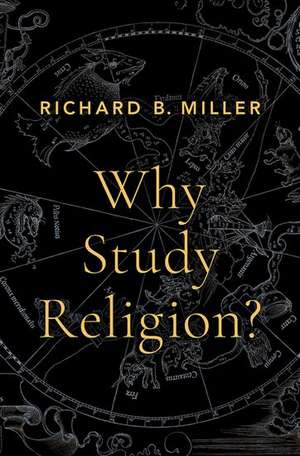Why Study Religion?
Autor Richard B. Milleren Limba Engleză Hardback – 12 ian 2023
Preț: 264.89 lei
Preț vechi: 304.44 lei
-13% Nou
Puncte Express: 397
Preț estimativ în valută:
50.69€ • 53.06$ • 41.94£
50.69€ • 53.06$ • 41.94£
Carte disponibilă
Livrare economică 04-10 martie
Livrare express 01-07 martie pentru 79.55 lei
Preluare comenzi: 021 569.72.76
Specificații
ISBN-13: 9780197566817
ISBN-10: 0197566812
Pagini: 384
Dimensiuni: 242 x 166 x 33 mm
Greutate: 0.64 kg
Editura: Oxford University Press
Colecția OUP USA
Locul publicării:New York, United States
ISBN-10: 0197566812
Pagini: 384
Dimensiuni: 242 x 166 x 33 mm
Greutate: 0.64 kg
Editura: Oxford University Press
Colecția OUP USA
Locul publicării:New York, United States
Recenzii
This brilliant book is both a powerful criticism of the current state of religious studies and an impassioned plea for an entirely new approach.... Essential.
Religious studies scholars often struggle to articulate the value of what they do. Why Study Religion? offers a robust vindication of the academic study of religions that will be of value to any scholar (or any dean)looking to see the future of the humanities.
Miller's book is a major contribution to the critical study of leading methods in the field of Religious Studies. But the heart of the book, and where it really shines, is in its extension of the 'normative turn' in religious studies. Miller wants us to look beyond our obsession with method and to leave behind the scholarly ideal of 'value neutrality' and instead ask ourselves why we should study religious people, ideas, practices, and artifacts. His own answer to this question, which frames religious studies as a form of 'critical humanism,' is as persuasive as it is provocative. It is an answer that takes us beyond the study of religion to the humanities and to the question of what it is to be a thinking, responsible actor in the world.
Miller has written a thoughtful, creative, clear, and well-researched book that offers an important contribution to the field of religious studies. It is wide-ranging, brimming with arguments, and attuned to detail. What we have here is the most robust, intellectually serious, and comprehensive "meta-disciplinary" work in religious studies to date.
There are many reasons to admire this book and many ways in which scholarship might benefit from it. Miller's critical engagements with the field's prominent methodologies are well executed and insightful.
Religious studies scholars often struggle to articulate the value of what they do. Why Study Religion? offers a robust vindication of the academic study of religions that will be of value to any scholar (or any dean)looking to see the future of the humanities.
Miller's book is a major contribution to the critical study of leading methods in the field of Religious Studies. But the heart of the book, and where it really shines, is in its extension of the 'normative turn' in religious studies. Miller wants us to look beyond our obsession with method and to leave behind the scholarly ideal of 'value neutrality' and instead ask ourselves why we should study religious people, ideas, practices, and artifacts. His own answer to this question, which frames religious studies as a form of 'critical humanism,' is as persuasive as it is provocative. It is an answer that takes us beyond the study of religion to the humanities and to the question of what it is to be a thinking, responsible actor in the world.
Miller has written a thoughtful, creative, clear, and well-researched book that offers an important contribution to the field of religious studies. It is wide-ranging, brimming with arguments, and attuned to detail. What we have here is the most robust, intellectually serious, and comprehensive "meta-disciplinary" work in religious studies to date.
There are many reasons to admire this book and many ways in which scholarship might benefit from it. Miller's critical engagements with the field's prominent methodologies are well executed and insightful.
Notă biografică
Richard B. Miller is a Laura Spelman Rockefeller Professor of Religion, Politics, and Ethics at the University of Chicago Divinity School. He is the author of Friends and Other Strangers: Studies in Religion, Ethics, and Culture, and the award-winning Interpretations of Conflict: Ethics, Pacifism, and the Just-War Tradition; Casuistry and Modern Ethics: A Poetics of Practical Reasoning; and Terror, Religion, and Liberal Thought.
